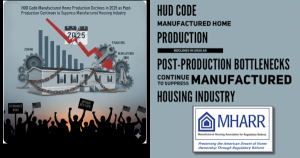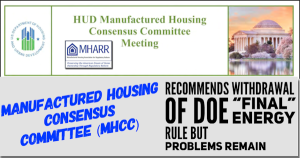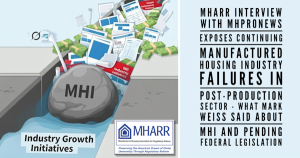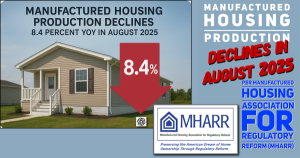Washington, D.C.
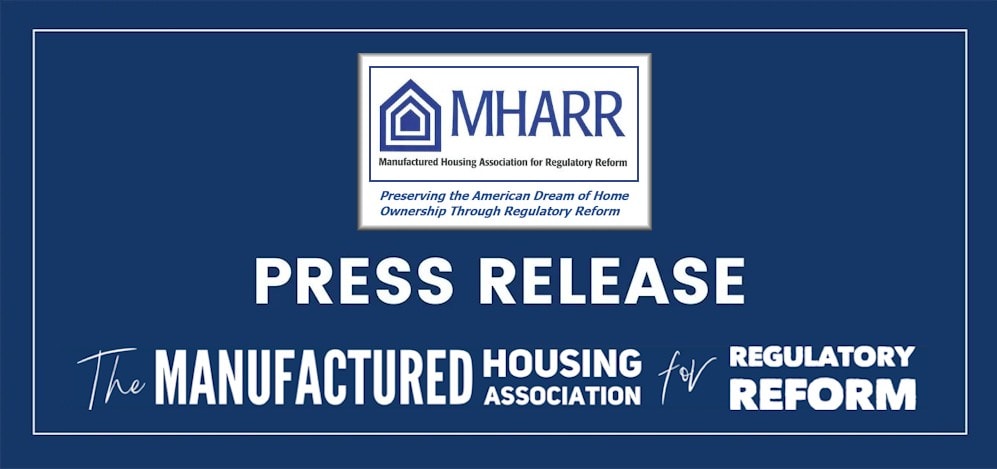
SEPTEMBER 8, 2025
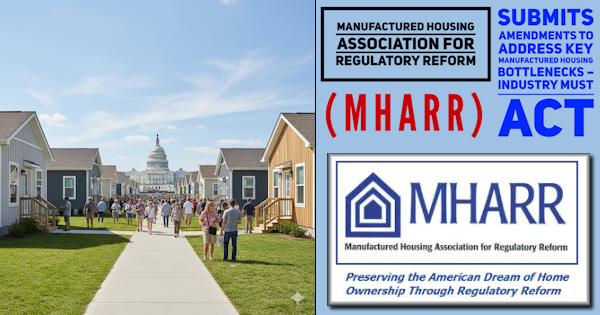
IMPORTANT
TO: HUD CODE MANUFACTURED HOUSING INDUSTRY MEMBERS
FROM: MHARR
RE: SUBJECTS AS LISTED BELOW
I. MHARR SUBMITS AMENDMENTS TO ADDRESS KEY MH BOTTLENECKS – INDUSTRY MUST ACT
With Congress having returned from its Summer Recess, MHARR has taken a major step in relation to legislation affecting the industry that could advance during the remainder of the current session.
Specifically, on July 29, 2025, the Senate Banking, Housing and Urban Affairs Committee voted to approve and send to the full Senate the Renewing Opportunity in the American Dream to Housing Act of 2025 (ROAD to Housing Act) originally sponsored by Committee Chairman, Sen. Tim Scott (R-SC). As industry members are aware, that bill contains a number of provisions that would impact the HUD Code manufactured housing industry including, most particularly, a provision which would make the current “permanent chassis” mandate optional instead.
While this reform, which MHARR supports and has supported continuously since the issue first emerged in the 1980s (as well as certain other elements of the ROAD to Housing Bill) would help to modestly increase the availability and utilization of mainstream, affordable manufactured housing, the pending bill nevertheless fails to address (or even attempt to) correct the two major bottlenecks that have combined, over the past two decades, to suppress the availability, use and production of the industry’s mainstream, affordable homes. These bottlenecks and the failure to address them in the ROAD to Housing bill, were detailed in an MHARR analysis entitled “A Critical Analysis of the U.S. Senate ROAD to Housing Act of 2025,” which was widely distributed to the industry and other interested individuals and companies on August 14, 2025. Those unaddressed major bottlenecks are:
- (1) The proliferation of zoning mandates that discriminatorily exclude or unreasonably restrict the placement of HUD-regulated manufactured homes; and
- (2) The failure of Fannie Mae and Freddie Mac to implement the statutory Duty to Serve Underserved Markets (DTS) with respect to the nearly 80% of the manufactured home consumer finance market represented by personal property (chattel) loans.
Given the profoundly negative impacts of these bottlenecks on the production and availability of inherently affordable mainstream manufactured housing for lower and moderate-income Americans, MHARR in recent meetings on Capitol Hill, has urged Congress to take specific action, in the context of the ROAD to Housing Bill, to address and, more importantly, remedy these bottlenecks which represent not only a major policy failure over multiple administrations but, more importantly, amount to open defiance of Congress, which has already made very clear its meaning and intent with respect to these issues in previous legislation.
Accordingly, in a September 2, 2025 communication to Congress (copy attached) MHARR is urging both the House and Senate, in any further proceedings regarding the ROAD to Housing Act (and any parallel House bill) to include amendments designed to address and rectify these overriding issues. Included with this communication is specific proposed amendment language designed to:
- (1) To compel HUD to fully enforce the enhanced federal preemption of the Manufactured Housing Improvement Act of 2000 to “prevent, prohibit and remedy the zoning exclusion [of] or discriminatory restrictions on the placement of manufactured homes in any state or local jurisdiction thereof;” and
- (2) To compel Fannie Mae and Freddie Mac to implement DTS with respect to manufactured home personal property consumer loans by expressly making the inclusion of such loans in DTS mandatory.
Attached, for your convenience and review, is the proposed legislative language for each such issue, and related justifications for their inclusion in the ROAD to Housing Act or any final bill addressing the nation’s affordable housing needs.
It is essential for both the long-term and near-term success of the industry – as well as the interests of American consumers of genuinely affordable housing — that these fundamental bottlenecks be addressed and eliminated to the greatest degree possible. While other issues are relevant and should be addressed, the enactment of much-needed affordable housing reform and availability legislation without these provisions would be a hollow victory, that would leave the industry and its consumers still facing baseless discriminatory and exclusionary policies at all levels of government. Such a result would be inexcusable, and the industry must rally to demand the rectification of these major issues.
The inclusion of the MHARR-proposed language in the ROAD to Housing Bill would go a long way toward ensuring that the bill would have its desired impact – of promoting and expanding the supply of genuinely affordable housing and homeownership for all Americans, rather than leaving stranded – with no remedy – millions of lower and moderate-income Americans whose “dream” of homeownership has effectively been stolen by exclusionary zoning mandates and enforcement and a federal housing finance bureaucracy that would rather make risky loans to marginally-qualified buyers than provide truly affordable homeownership opportunities at lower prices. As MHARR has emphasized, it is time for Congress to make it clear to the agencies involved that compliance with the law is not optional.
II. DOE SEEKS FURTHER INPUT ON MH ENERGY STANDARDS
The U.S. Department of Energy (DOE), on September 3, 2025, issued a Request for Information (RFI) concerning its pending “energy conservation” standards for federally-regulated manufactured housing. In a News Release concerning the RFI, DOE gave possible hints regarding the future direction of its manufactured housing energy standards rulemaking, which currently has standards that have been adopted as a final rule but not yet implemented, and proposed enforcement procedures that have been published for comment but have not yet been adopted as a final rule.
Specifically, in the News Release, DOE states that “Responses to the RFI will inform DOE’s technical analysis of [the] existing standards and facilitate the Department’s ongoing effort to roll back unnecessary regulations on the manufactured housing market.” (Emphasis added). The DOE News Release further states, “The RFI issued today will provide DOE with valuable public feedback as it considers its next deregulatory action.” (Emphasis added).
These statements are potentially significant in that they are consistent with the position taken by MHARR in a July 1, 2025 meeting with DOE Principal Deputy Assistant Secretary for Energy Efficiency and Renewable Energy, Lou Hrkman, who is quoted at length in the News Release. As was previously reported by MHARR, the MHARR delegation that met with Deputy Assistant Secretary Hrkman on July 1, 2025, emphasized the need to totally withdraw the May 31, 2022 DOE “final” manufactured housing energy standards insofar as those standards – driven by the extremist agenda of “climate” special interests, would exclude millions of Americans from the manufactured housing market at a time of an unprecedented affordable housing availability crisis, and would be totally inconsistent with – and destructive of – the affordable housing policies of President Trump and his Administration.
Accordingly, MHARR will file comments in response to the RFI calling again for the total repeal and repudiation of the May 31, 2022 standards as well as a fundamental reconsideration – from the ground up – of the need (if any) for any new or additional “energy” standards beyond those already contained in the HUD Code.
As always, MHARR will publish its comments in advance of the RFI deadline for use or reference by other industry members. Comments in response to the RFI are due on or before December 2, 2025.
Manufactured Housing Association for Regulatory Reform (MHARR)
1331 Pennsylvania Ave N.W., Suite 512
Washington D.C. 20004
Phone: 202/783-4087
Fax: 202/783-4075
Email: MHARRDG@AOL.COM
Website: www.manufacturedhousingassociation.org
MHARR press releases are available for re-publication in full (i.e., without alteration or substantive modification) without further permission and with proper attribution and/or linkback to MHARR.

